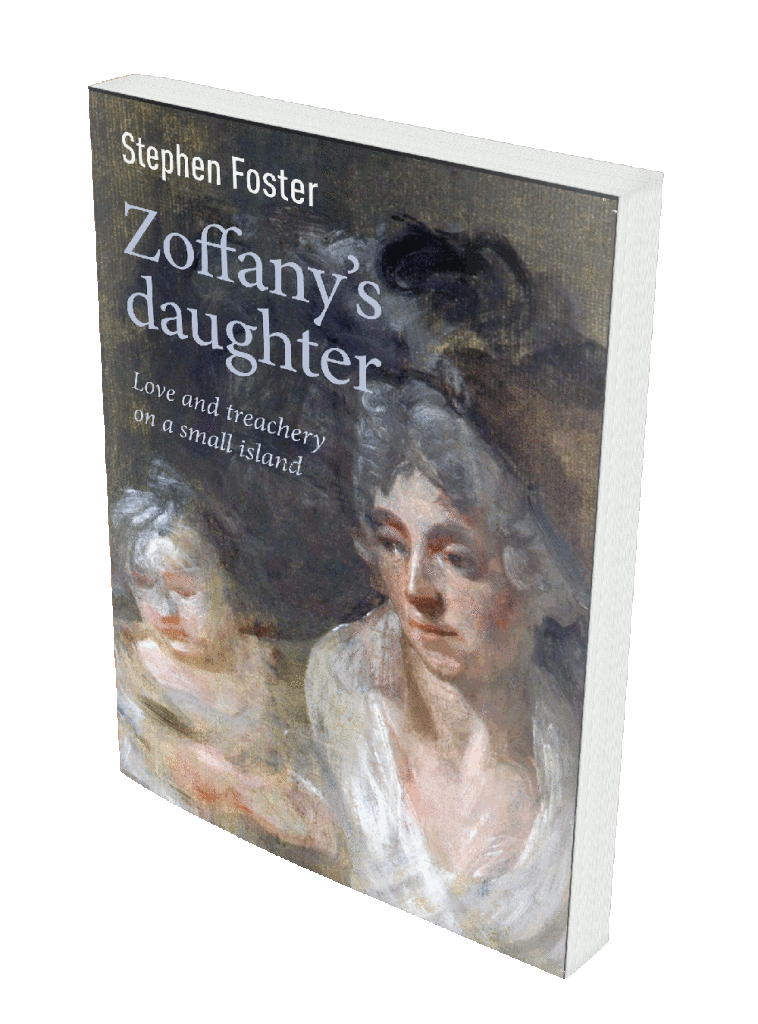Jane Stephens*
‘Review note: Stephen Foster: Zoffany’s Daughter: Love and Treachery on a Small Island’, Honest History, 13 January 2018
This intriguing narrative, appropriately first published in the Channel Islands, is based on extensive research into an obscurely unsettling 19th century child custody case. The work is a kind of fictionalised history which the author manages most successfully, adding zest to the meagre facts without compromising a scholarly foundation.
Johan Zoffany was born in Germany in 1733, but later moved to England, where he was a prolific and successful painter. His daughter, Cecilia, apparently a woman of some spirit and strength of character, was therefore raised in comfortable circumstances. She was reputed to be intelligent and lively and very beautiful. At a relatively young age, Cecilia married a Reverend Horne, who provided well for her and their children. What could possibly go wrong?
 The scene – and the beginnings of the answer to that question – is set at the start of the book with a startling and enigmatic news item from the London Morning Chronicle of October 1825. Cecilia, Mrs Horne, ‘wife of a clergyman’ and ‘of rank and fashion’ had been arrested and sent to prison on the island of Guernsey, whence she had fled with two of her children after separating from her husband. The father, having discovered the whereabouts of the children, attempted to gain custody of the younger one, a girl of around ten. However, the mother had dressed the child as a boy and hidden her. Hence the prison, as the Royal Court of Guernsey had issued a mandamus that the child should be surrendered to the father.
The scene – and the beginnings of the answer to that question – is set at the start of the book with a startling and enigmatic news item from the London Morning Chronicle of October 1825. Cecilia, Mrs Horne, ‘wife of a clergyman’ and ‘of rank and fashion’ had been arrested and sent to prison on the island of Guernsey, whence she had fled with two of her children after separating from her husband. The father, having discovered the whereabouts of the children, attempted to gain custody of the younger one, a girl of around ten. However, the mother had dressed the child as a boy and hidden her. Hence the prison, as the Royal Court of Guernsey had issued a mandamus that the child should be surrendered to the father.
How this situation came about, and how it was resolved, is the subject of the book. To the extent that the book has shortcomings, these are due more to the absence of certain key facts and voices than to the author’s lack of skill. The author has enlivened the narrative by providing a fictionalised diary written by the daughter of Zoffany’s daughter, one Clementina. Beyond that, to keep true to the historical subject, Foster has avoided speculating and fabricating in relation to the missing pieces of the puzzle, as is entirely correct.
Nevertheless, this tactic means that the reader is left at certain points feeling irritated that questions are left unanswered. Clementina’s diary plumps up the narrative very effectively, but her diary is unable to tell us why exactly the Hornes took the unusual (for the times) step of separating, and why indeed, Cecilia chose Guernsey as a place of refuge.
Hence, the reader endures the unsettling effect of being deprived of some of the important whys and wherefores – and there seems to be insufficient known about Cecilia’s later years to enable light to be shed in hindsight, as it were. Apparently, a mother’s love is at the heart of the matter, as is mooted at the end of the book.
Jane Stephens is a former chief executive of not-for-profit organisations.